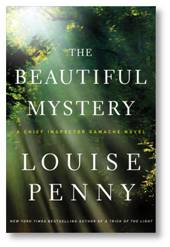As so often happens (at least with me) two seemingly unrelated things came together and caused me to think about what they had in common. One is a book with an explanation and the other a movie that made steam come out of my ears. This juxtaposition drove me to write a post that concerns religion, despite my blog’s mission statement.
Some background information: I am a recovering Catholic with six years of parochial school, eight years of choir, the First Fridays of the Month and several sacraments under my belt. Grades one through six were taught by the Sisters of St. Joseph from Quebec Province.These nuns had the people skills of Simon Cowell, the teaching style of a Marine drill sergeant, and the empathy of Rush Limbaugh. You didn’t get an education from Les Soeurs de St. Joseph for the joy of learning; you studied to survive.
My French Canadian family traced our ancestry on both sides back to Quebec Province so I always thought of it as a place where Catholicism was deeply ingrained. Buried deep in my brain was the idea that people might leave the Church here in America but the Québecois would guard the faith as fervently as they protect the French language. I thought they would hold out forever.
 Beautiful Mystery
Beautiful Mystery
Then I read Beautiful Mystery by Louise Penny. This is volume eight in a series of mysteries about Chief Inspector Armand Gamache and his Deputy Inspector, Jean-Guy Beauvoir, of the Sûreté du Québec. CI Gamache is a practicing Catholic while D.I. Beauvoir is not. Neither is he a lapsed Catholic—he simply has nothing to do with the Church of his ancestors. Ms. Penny says of him, “No one Beauvoir knew even went to church, never mind dedicated his life to it.”
This, it seems, is typical of the younger generations in Francophone Canada and D.I. Beauvoir does not think about it until he is sent, along with C.I. Gamache, to solve a murder in the monastery of St. Gilbert Entre Les Loups (St. Gilbert Among the Wolves). It is, however, a fact that I had trouble digesting, knowing as I do how strong the faith was in my parents’ generation and with the nuns. In Beautiful Mystery, Ms. Penny has D.I. Beauvoir explain the transformation eloquently.
“Like many Quebecois of his generation, he had no use for the Church. It just wasn’t part of his life. Unlike previous generations. The Catholic Church wasn’t just a part of his parents’ lives, and his grandparents’, it ruled their lives. The priests told them what to eat, what to do, who to vote for, what to think. What to believe.
“Told them to have more and more babies. Kept them pregnant and poor and ignorant. They’d been beaten in school, scolded in church, abused in the back rooms.
“And when, after generations of this, they’d finally walked away, the Church had accused them of being unfaithful. And threatened them with eternal damnation.”
The Lost Child of Philomena Lee
 Then we went to see Philomena. This is an excellent small movie that deserves to have a much larger audience. Based on the book The Lost Child of Philomena Lee by Martin Sixsmith, it tells the true story of an Irish woman, played by Judi Dench, who as an unwed teenager was sent to Roscrea Abbey to have her baby—dropped off, actually, by a shamed father who abandoned her there.
Then we went to see Philomena. This is an excellent small movie that deserves to have a much larger audience. Based on the book The Lost Child of Philomena Lee by Martin Sixsmith, it tells the true story of an Irish woman, played by Judi Dench, who as an unwed teenager was sent to Roscrea Abbey to have her baby—dropped off, actually, by a shamed father who abandoned her there.
The Abbey was part of the Magdalene Laundry system and the pregnant girls worked in the laundry without pay for seven days a week. (So much for Sunday being the Lord’s Day). They gave birth with little medical care and their pain was considered penance for their sin of wantonness. It goes without saying that no one in 1955 thought that some of the girls may have been raped or victims of incest or that the men and boys got away without penalty for their wantonness.
Once Philomena’s child is born, she is forced to stay and work for four years to compensate the nuns for her care. She is allowed to see her son for just an hour a day but that only lasts until a rich American couple drives up in search of a child to adopt. Her son is sent away without Philomena even being told, much less consulted.
The movie begins with her as an old woman still searching for the toddler who disappeared, the child who was put into a big car with strangers and driven away, the son she has never forgotten. Now the universe has sent her unemployed journalist Martin Sixsmith who agrees to help her in her search. The story that follows—and the scenes of what happened to her at Roscrea Abbey—are unforgettable.
Steam and Questions
By the end of the movie I was emitting the aforementioned steam, accompanied by the questions that fueled it.
- How dare these people, who set themselves up as superior in every way, behave with such inhumanity?
- How could women who eschewed the very process of reproduction become the moral arbiters of those creating the human race’s next generation?
- How could women who served the Order of the Sacred Heart of Jesus, dedicated to God’s love, behave in such a hateful way to any other human being, much less to helpless girls?
- How could they have been so callous and unconcerned with a mother’s love for her child, both when she delivered that baby and later when she sought her adult son?
Sitting in the theater, the hypocrisy of it washed over me anew. I’m an Aquarius so I find it difficult to accept injustice as a fact of life. Like so many people I know, neither I nor any of my siblings, are still Catholic. Like the younger generation in Quebec, we abandoned the Church for many reasons—this hypocrisy and abuse of authority foremost among them. As the first Baron Acton famously said, “Power corrupts and absolute power corrupts absolutely.” But free people don’t have to tolerate abuse. We can choose to leave.
Ms. Penny gets the last word in Beautiful Mystery:
“The words sounded strange on Beauvoir’s tongue. Abbots and priors and monks, oh my. They weren’t part of the vocabulary of Québec anymore. Not part of daily life. In just a generation those words had gone from respected to ludicrous. And soon they’d disappear completely.”
BTW: I highly recommend the movie to thinking folks who want to see how the mystery of Philomena’s search for her son plays out. And Judi Dench gives a superb performance.
